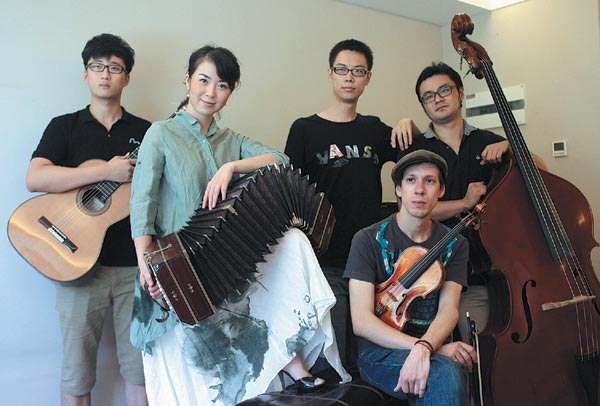

 |
|
Tango Libertad band features Liu Shanshan, Spanish violinist Daniel Hurtado and three Chinese musicians: guitarist Zhang Wei, pianist Hui Dui and double-bass player Hu Jun. Zou Hong / China Daily |
Liu Shanshan's childhood was not happy. Like many Chinese children, who are pressed by their parents to study musical instruments, she played accordion for hours every day.
Born in Chongzhou, Sichuan province, the big-eyed girl went to Xi'an with her soldier father and started learning the instrument at 5. Though her father told her it was noble and was seen as an army instrument because many red songs were played on it, Liu felt stifled by the accordion.
"I couldn't go out with my friends and I was a lonely kid," the 32-year-old Liu recalls.
Though her music training exposed her mainly to Bach and Mozart, she gravitated more to Michael Jackson, she says. But then she found tango music and it spoke to her heart.
"The bandoneon made my hair stand on end," she says of the accordion-like instrument favored by the composer Astor Piazzolla. "I fell in love with Piazzolla's music at once. I thought it was the coolest thing on earth.
"The sound of bandoneon played by left hand is low and warm but the right hand plays sharp, cold and high-pitched tunes," she says. "It contains loneliness, struggle and fire within at the same time."
She played Libertango, a Piazzolla masterpiece in 1974 for her graduation concert at the middle school attached to the Sichuan Conservatory of Music in 2002.
Liu went to Germany to study at Hanover University of Music, Drama and Media and obtained her master's degree in music education and accordion performance.
Ten years later, Liu would form her tango band, naming it Tango Libertad to reflect the band's pursuit of music freedom. She recruited Spanish violinist Daniel Hurtado and three Chinese musicians: guitarist Zhang Wei, pianist Hui Dui and double-bass player Hu Jun. They will give three concerts next week in Beijing, which will be the band's first public shows in the capital.
The program will feature works from the master Piazzolla, including Concierto para Quinteto, Invierno Porteno and Oblivion, and Milonga for Three, which can be heard on the soundtrack of Wong Kar-wai's Happy Together in 1997.
Related: